

"A call for an empowering, inclusive and safe digital environment for children" - Side Event 28th session Human Rights Council Monday, 9 March 12.00-2.30 Palais des Nations, Geneva. Jointly organised by the SRSG on violence against children and the UN Special Rapporteur on the sale of children, child pornography and child prostitution, the event explored children’s engagement with ICTs and the opportunities and risks that this represents for children’s rights.
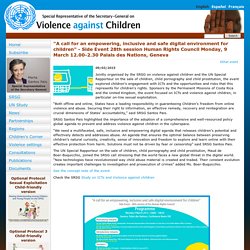
Sponsors by the Permanent Missions of Costa Rica and the United Kingdom, the event focused on ICTs and violence against children, in particular on-line sexual exploitation. “Both offline and online, States have a leading responsibility in guaranteeing Children’s freedom from online violence and abuse. Securing their right to information, an effective remedy, recovery and reintegration are crucial dimensions of States’ accountability,” said SRSG Santos Pais.
SRSG Santos Pais highlighted the importance of the adoption of a comprehensive and well-resourced policy global agenda to prevent and address violence against children in the cyberspace. See the concept note of the event. Research & Policy. Who cares? Practical ethics and the problem of underage users on social networking sites. Internet companies place a high priority on the safety of their services and on their corporate social responsibility towards protection of all users, especially younger ones.
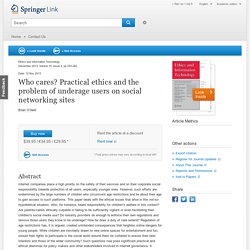
However, such efforts are undermined by the large numbers of children who circumvent age restrictions and lie about their age to gain access to such platforms. This paper deals with the ethical issues that arise in this not-so-hypothetical situation. Who, for instance, bears responsibility for children’s welfare in this context? Are parents/carers ethically culpable in failing to be sufficiently vigilant or even facilitating their children’s social media use? Helping Children Survive & Thrive. Child Safety Online: Global Challenges and Strategies Although offering more opportunities for education and information than at any time in history, the Internet has also amplified the scale and potential of threats to children, says a new report from UNICEF’s Innocenti Research Centre.
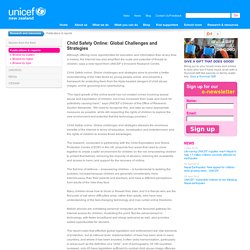
Child Safety online: Global challenges and strategies aims to provide a better understanding of the risks faced by young people online, and presents a framework for protecting them from the triple-headed dangers of child abuse images, online grooming and cyberbullying. “The rapid growth of the online world has not created crimes involving sexual abuse and exploitation of children, but it has increased their scale and reach for potentially causing harm,” says UNICEF’s Director of the Office of Research, Gordon Alexander.
Mobile phones are overtaking personal computers as the favoured gateway for Internet access for children, illustrating the point. The Internet, Children, and Privacy: The Case Against Parental Monitoring by Kay Mathiesen. New VGT partner Kik Takes Steps to Combat Exploitation of Minors – Virtual Global Taskforce. 10 March 2015 Kik Interactive has taken two important steps towards preventing exploitation of minors in its chat app, Kik.

The Waterloo-based company has become the first Canadian company to adopt Microsoft PhotoDNA Cloud Service, an industry-leading technology used to detect exploitative images, and has joined the Virtual Global Taskforce (VGT), a global anti-child abuse organization. These moves emphasize Kik’s commitment to trust and safety, and are part of a wider ongoing effort to eradicate online behavior that is harmful to minors. PhotoDNA Cloud Service FAQ. Thinkuknow - home. Parent Guide to Internet Safety. Dear Parent: Our children are our nation’s most valuable asset.
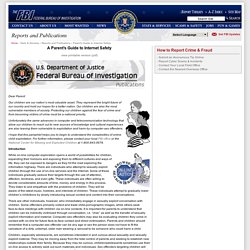
They represent the bright future of our country and hold our hopes for a better nation. Our children are also the most vulnerable members of society. Protecting our children against the fear of crime and from becoming victims of crime must be a national priority. Unfortunately the same advances in computer and telecommunication technology that allow our children to reach out to new sources of knowledge and cultural experiences are also leaving them vulnerable to exploitation and harm by computer-sex offenders. I hope that this pamphlet helps you to begin to understand the complexities of online child exploitation. Introduction While on-line computer exploration opens a world of possibilities for children, expanding their horizons and exposing them to different cultures and ways of life, they can be exposed to dangers as they hit the road exploring the information highway.
You find pornography on your child’s computer. Censorship Child Safety Online. We have also compiled a selection of useful links to other websites related to Internet safety, censorship and child safety issues, including some interactive sites for children.
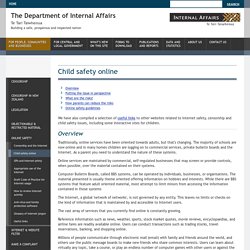
Overview Traditionally, online services have been oriented towards adults, but that's changing. The majority of schools are now online and in many homes children are logging on to commercial services, private bulletin boards and the Internet. As a parent you need to understand the nature of these systems. Online services are maintained by commercial, self-regulated businesses that may screen or provide controls, when possible, over the material contained on their systems. Computer Bulletin Boards, called BBS systems, can be operated by individuals, businesses, or organisations. The Internet, a global 'network of networks', is not governed by any entity. The vast array of services that you currently find online is constantly growing.
Most people who use online services have mainly positive experiences. Agreement: